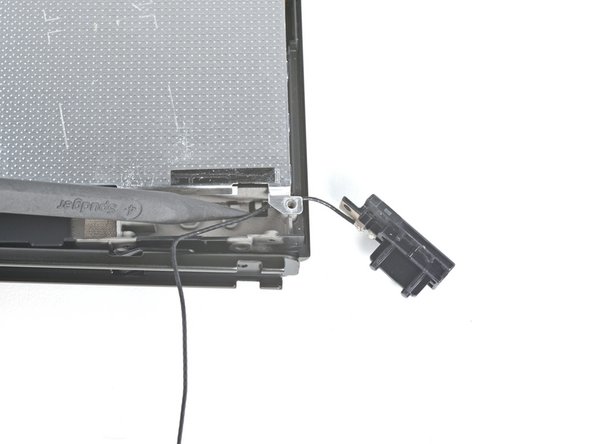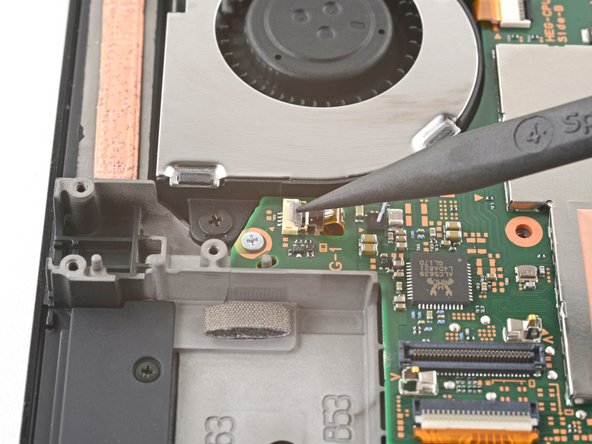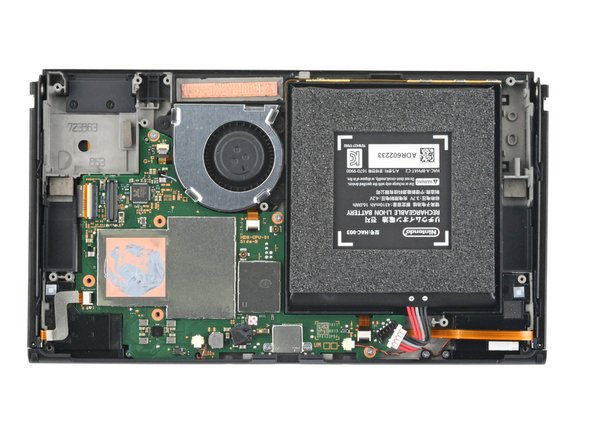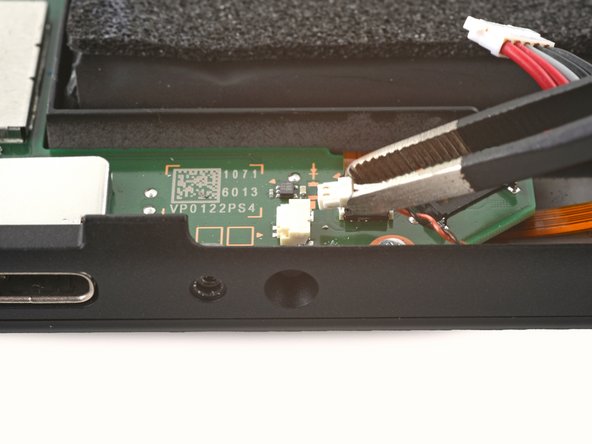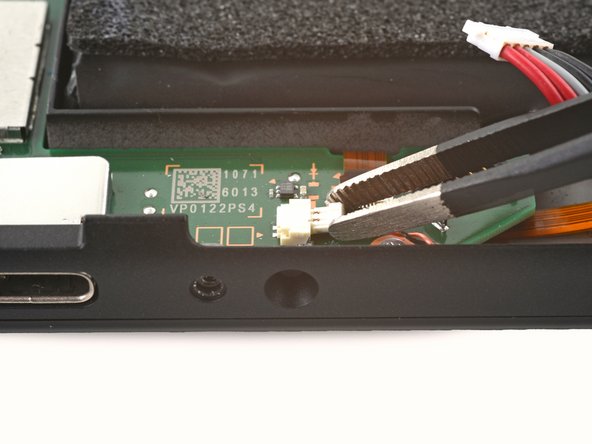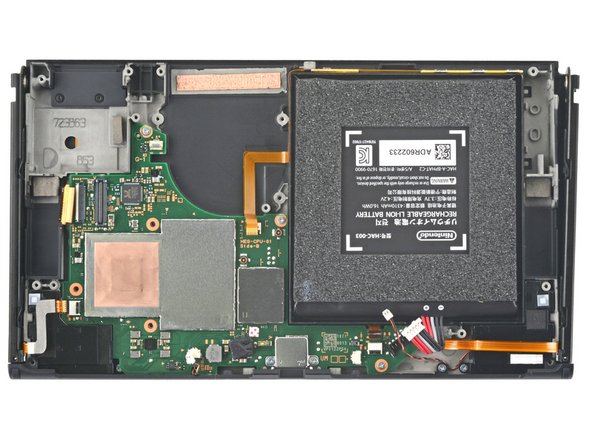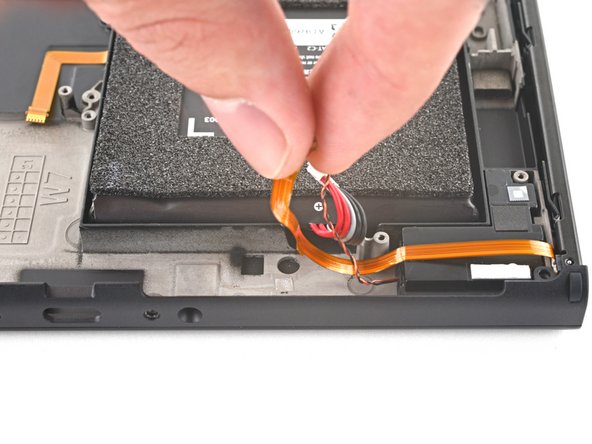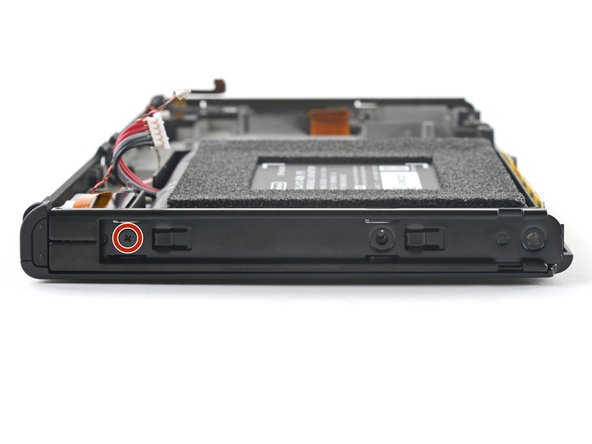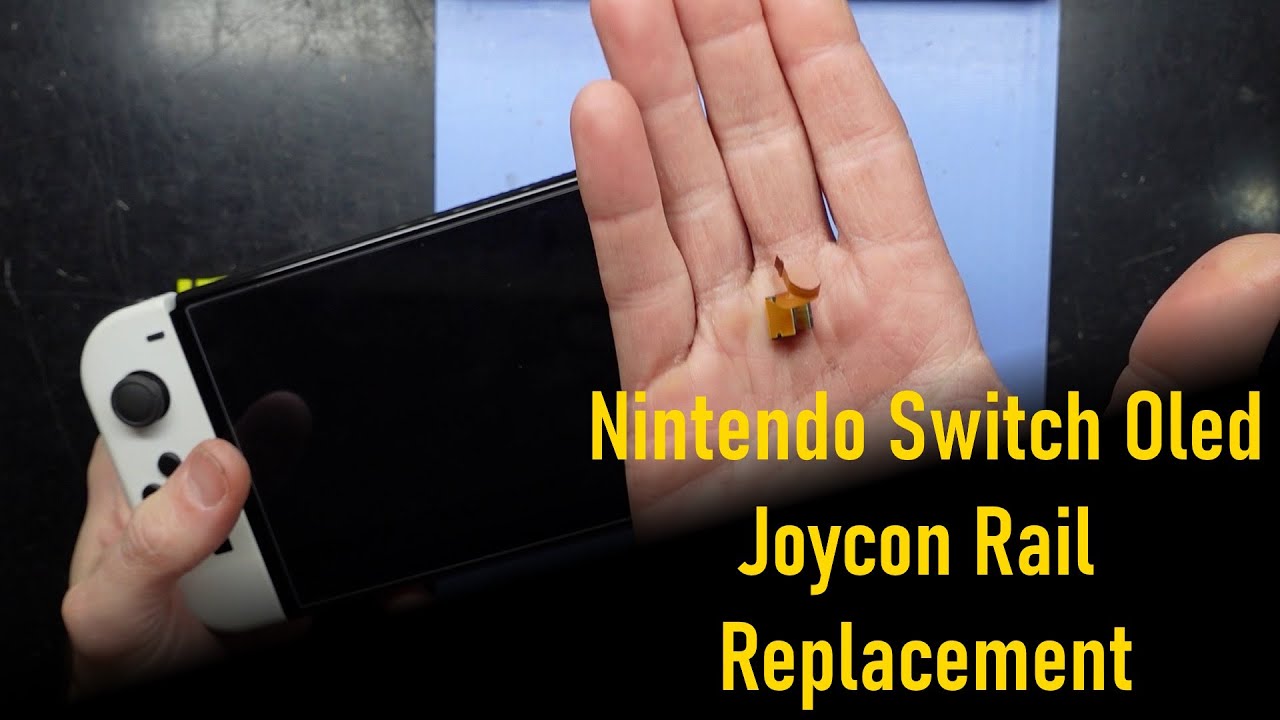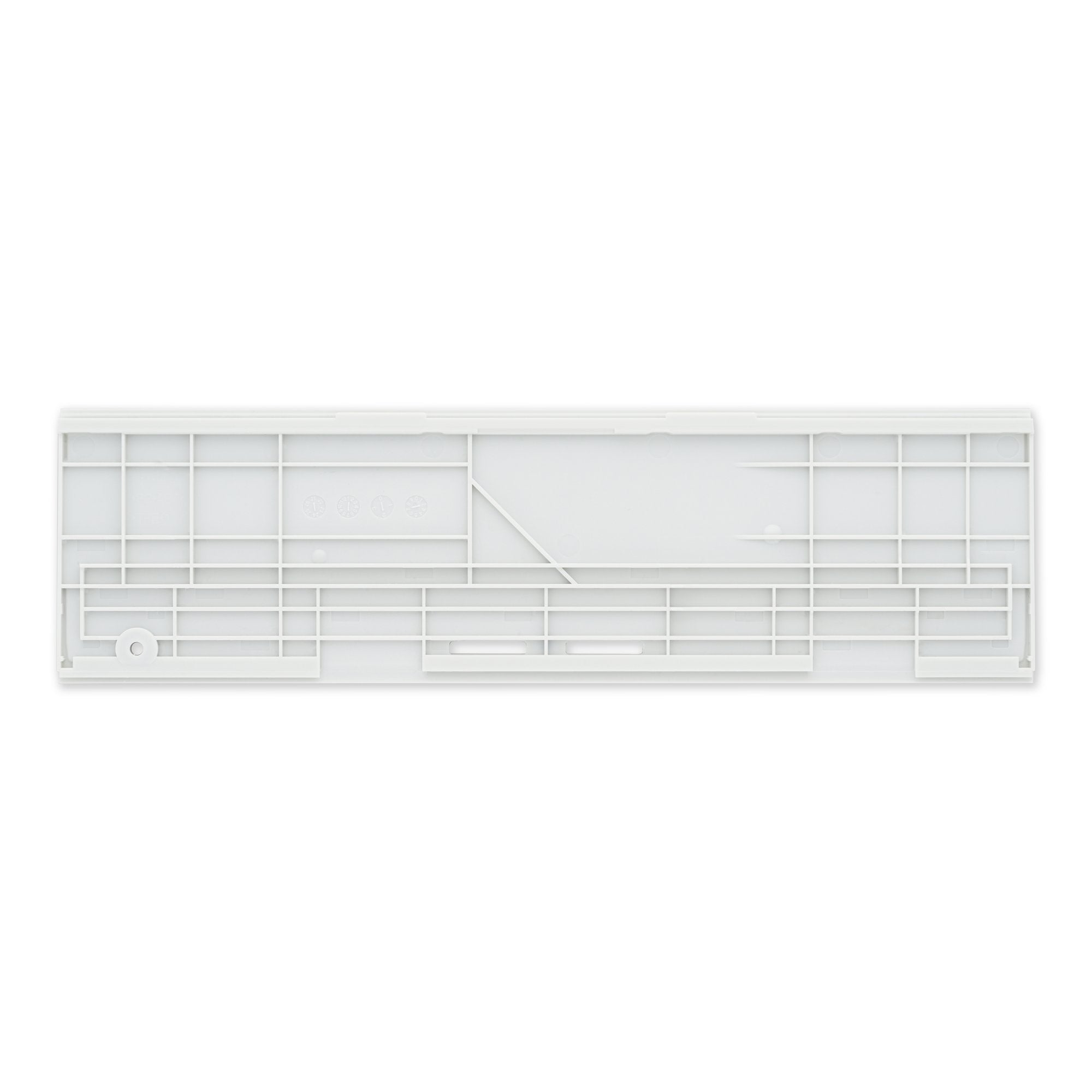How to Replace Nintendo Switch OLED Left Joy-Con Rail
Duration: 45 minutes
Steps: 49 Steps
For your safety, make sure to drain that battery below 25% before diving into the guts of your Switch!
Get ready to swap out the left Joy-Con sensor rail on your Nintendo Switch OLED! Before diving in, make sure to drain that battery below 25%—it’s a smart move to keep things safe and sound while you work. If your battery looks a bit puffy, take extra care. The Switch OLED loves JIS screws, but if you’re in a pinch, a Phillips screwdriver will do the trick—just be gentle to avoid stripping those screws. Our Phillips bits are perfect for JIS-style screws, so you’re covered! Oh, and when you take off the shield plate, don’t forget to refresh the thermal compound between the plate and the heatsink. Regular thermal paste isn’t up for the job of bridging big gaps, so grab some K5 Pro viscous thermal paste instead. And remember, you’ll need standard thermal paste when swapping out the heat sink. If you hit a snag, don’t hesitate to schedule a repair!
Step 1
Make sure your device is fully powered down before you kick off this repair adventure!
– Give that little round button on the back of your Joy Con controller a good press and hold, like you’re trying to summon a genie!
– While you’re holding that button down, slide the controller up like it’s on a fun little elevator ride.
Step 2
Now it’s time to give the other Joy Con some love – repeat the same process to get it up and running too!
– Keep sliding that Joy Con upward until it’s totally free from the console!
Step 3
To keep those stubborn screws from becoming stripped, press down firmly, take your time, and if they’re being a little too feisty, give another JIS or Phillips driver a try!
– Grab your trusty Phillips or JIS driver and get ready to tackle that 2 mm-long screw holding the top of the rear case to the frame. You’ve got this!
Step 4
– Grab your Phillips driver and unscrew the two 2mm screws holding the bottom of the rear case to the frame. Time to get that case off!
Step 5
To keep those pesky screws from becoming stripped, press down firmly and take your time. If they’re still being stubborn, give another JIS 000 or PH 000 driver a shot. You’ve got this!
– Let’s get started! Use a Phillips driver to carefully remove the 3.8mm screw that’s holding the right Joy-Con sensor rail in place at the back of the case.
Step 6
– Let’s get started by removing the 3.8 mm screw that’s holding the left Joy-Con sensor rail in place. Grab your trusty Phillips driver and get to work! Simply unscrew the 3.8 mm screw to release the rail from the rear case.
Step 7
Got a microSD card chillin’ in the slot? Go ahead and pop it out before diving into the next step.
– Give that kickstand a little nudge with your finger and watch it pop up from the back of your device like magic!
Step 8
– Let’s get started! Use a Y00 screwdriver to carefully remove the two 4.3 mm screws that hold the rear case in place. This is the first step in getting your device back up and running!
Step 9
If you’re having a tough time getting the case off, grab an opening pick and carefully work your way around the plastic clips to pop them loose.
– Pop that rear case up from the top of the device and lift it off.
Step 10
– Let’s get started by using the flat end of a spudger to gently pry a corner of the tape away from the shield plate.
Tools Used
Step 11
– Grab your trusty tweezers or just your fingers, and gently peel back that tape like a pro.
– Find a clean spot to keep the tape safe for when it’s time to put it back on.
Tools Used
Step 12
– Grab your trusty tweezers or just use your fingers to gently lift and disconnect the primary Wi-Fi antenna’s coaxial cable. You’ve got this!
– When it’s time to put everything back together, reconnecting these little guys can be a bit of a puzzle. Take it slow—hold each connector right above its socket and give it a gentle press down with the flat end of a spudger. You’ll hear a satisfying snap when it clicks into place!
Step 13
– Grab your trusty tweezers or just your fingers, and gently guide the primary antenna’s coaxial cable out of its cozy slots in the shield plate. You’ve got this!
Tools Used
Step 14
– Grab your trusty Phillips driver and unscrew the two 4.4 mm fasteners holding down the primary Wi-Fi antenna to the shield plate. It’s like giving the antenna a break from its secure little perch!
Step 15
– Slide an opening pick between the main Wi-Fi antenna and the shield plate—it’s like separating a couple of stubborn besties.
– Gently lift the pick to detach the main Wi-Fi antenna from the shield plate. Take your time; you’ve got this!
Step 16
– Gently pop off the main Wi-Fi antenna like you’re opening a bag of chips—carefully and confidently!
Step 17
– Grab your tweezers or just use your fingers, and gently pop off that secondary Wi-Fi antenna’s coaxial cable like a pro!
Tools Used
Step 18
– Grab a spudger and gently guide the secondary Wi-Fi antenna’s coaxial cable out of its snug little slot in the frame—you’re basically a cable whisperer now!
Tools Used
Step 19
– Let’s get started! Use a Phillips driver to carefully remove the 4.4mm screw that’s holding the secondary Wi-Fi antenna in place on the shield plate. Take your time and make sure it’s removed safely.
Step 20
Hold your horses on yanking that antenna out just yet! Its coaxial cable is still snugly tucked through the frame.
– Slide an opening pick between the secondary Wi-Fi antenna and the shield plate—like slicing into a delicious cake layer.
– Gently pry upward with the pick to pop the secondary Wi-Fi antenna free from the shield plate. Easy does it!
Step 21
– Grab your trusty spudger and gently guide the secondary Wi-Fi antenna’s coaxial cable out of its cozy little slot in the frame.
– Now, it’s time to say goodbye to the secondary Wi-Fi antenna. Remove it with care!
Tools Used
Step 22
– Grab your trusty Phillips driver and let’s tackle those six 4.4 mm screws holding the shield plate snugly to the frame. You’ve got this!
Step 23
You might feel a little pushback here—don’t sweat it! The shield plate is stuck to the heat sink with some thermal paste, so it’s totally normal.
– Use your fingers to gently lift the top of the shield plate, pulling it away from the frame.
– Carefully remove the shield plate.
– You’ll notice a thick pink thermal compound sitting between the shield plate and the copper heat sink. Once the shield plate is off, it’s a great time to check out our thermal paste guide and swap out the old paste for a fresh layer of something like K5 Pro during reassembly.
Step 24
– Grab a trusty spudger and gently pop up the battery connector. Easy does it!
Tools Used
Step 25
– Grab some tweezers or just use your fingers to carefully peel off the piece of tape hiding that pesky daughterboard screw.
Tools Used
Step 26
– Grab your trusty Phillips driver and unscrew that 4 mm screw holding the daughterboard snugly to the frame. You’ve got this!
Step 27
The bottom of the daughterboard is hooked up to the motherboard using a handy press connector.
– Gently wedge a spudger between the daughterboard and motherboard—it’s like splitting up two besties at a party, but nicer.
– Carefully pry upward with the spudger to pop the press connector loose and liberate the daughterboard from the frame.
– Slide out the daughterboard like a pro.
– When reconnecting press connectors like this one, take it slow—align it perfectly, press down on one side until it clicks, then do the same on the other side. Avoid pressing in the middle; misaligned connectors can bend pins, and trust me, nobody wants that kind of drama. If things get tricky, you can always schedule a repair.
Tools Used
Step 28
– Grab your trusty Phillips driver and unscrew those three 3 mm screws holding the heat sink snugly to the motherboard. You’ve got this!
Step 29
You might notice a little pushback here, and that’s totally cool! It’s just the heat sink giving a gentle hug to the CPU thanks to some thermal paste. No worries, you’re doing great!
– Slide a spudger between the heat sink’s bracket and the motherboard.
– Gently pry up with the spudger to release the heat sink from the motherboard.
Tools Used
Step 30
– Start by sliding a spudger into the gap between the fan and the heat sink. Be gentle, no need to rush!
– Gently pry upwards with the spudger to loosen the heat sink from the adhesive underneath. Take it slow and steady.
– Carefully lift off the heat sink. You’re almost there!
– Use some high-concentration (90% or higher) isopropyl alcohol and a microfiber cloth to clean off the old thermal paste from both the heat sink and the CPU. Once it’s nice and clean, apply a fresh layer of thermal paste to the CPU before putting everything back together.
Tools Used
Step 31
– Grab your spudger, opening tool, or just your trusty fingernail and carefully lift the tiny, hinged locking flap on the fan cable’s ZIF connector.
Tools Used
Step 32
– Time to get that fan cable out! Use a trusty pair of tweezers to carefully pull the fan cable straight out of its connector on the motherboard. Nice and smooth, just like that!
Tools Used
Step 33
– Grab your trusty Phillips driver and unscrew the trio of 3 mm screws holding the fan snugly to the frame. You’ve got this!
Step 34
– Time to get that fan out! Use a spudger to carefully lift it straight out of the frame.
– Now that it’s loose, you can go ahead and remove the fan completely.
Tools Used
Step 35
– Grab your trusty opening tool, spudger, or even your own fingernail, and gently flip up that small, hinged locking flap on the power button board’s ZIF connector. You’ve got this!
Tools Used
Step 36
– Grab your trusty tweezers and gently slide the power button board cable straight out from its connector on the motherboard. Easy-peasy, right?
Tools Used
Step 37
– Grab your trusty opening tool, spudger, or even your fingernail, and gently lift the small, hinged locking flap on the right Joy-Con sensor rail’s ZIF connector. You’ve got this!
Tools Used
Step 38
– Grab a pair of tweezers and gently slide the right Joy-Con sensor rail’s cable straight out of its connector on the motherboard. Easy does it, no need to rush!
Tools Used
Step 39
– Grab your opening tool, spudger, or even your trusty fingernail, and gently pop up the hinged locking flap on the ZIF connector for the display. Easy peasy!
Tools Used
Step 40
– Grab a trusty pair of tweezers and gently pull the display cable straight out of its cozy connector on the motherboard. You’ve got this!
Tools Used
Step 41
– Grab those blunt tweezers, or use your fingers, and gently pull the left speaker’s JST connector right out of its cozy little socket.
Tools Used
Step 42
– Time to get a little handy! Use your fingers or some trusty blunt tweezers to gently pull the right speaker’s JST connector out of its socket. Take your time and be patient, you got this!
Tools Used
Step 43
– Grab an opening tool, spudger, or just your trusty fingernail, and gently flip up the tiny, hinged locking flap on the ZIF connector for the right Joy-Con sensor rail.
Tools Used
Step 44
– Use a pair of tweezers to pull the left Joy-Con sensor rail’s cable straight out of its connector on the motherboard.
Tools Used
Step 45
– Grab your trusty Phillips driver and unscrew the five screws holding the midframe and frame together:
– Three screws measuring 3 mm
– Two screws measuring 4.4 mm
Step 46
– Slide a spudger into the gap between the motherboard and the frame.
– Gently pry upwards with the spudger to detach the motherboard from the frame.
– Carefully lift out the motherboard.
Tools Used
Step 47
– Gently coax the left Joy-Con sensor rail’s cable away from the frame using your fingers, like you’re peeling a banana—easy does it!
Step 48
– Let’s get started! Use a Phillips driver to carefully remove the 3.8 mm screw that’s holding the left Joy-Con sensor rail in place on the frame. Easy does it!
Step 49
– Time to put your device back together! Just retrace your steps in reverse and you’ll be golden.
– Before you dive in, give your new replacement part a good look compared to the original. You might need to swap over some bits or peel off those pesky adhesive backings before installation.
– If things didn’t go as smoothly as you hoped, don’t sweat it! A little troubleshooting can work wonders, or feel free to reach out to our Nintendo Switch OLED Answers community for some extra support.
– And remember, if you find yourself in a real pickle, you can always schedule a repair.
Success!


















































